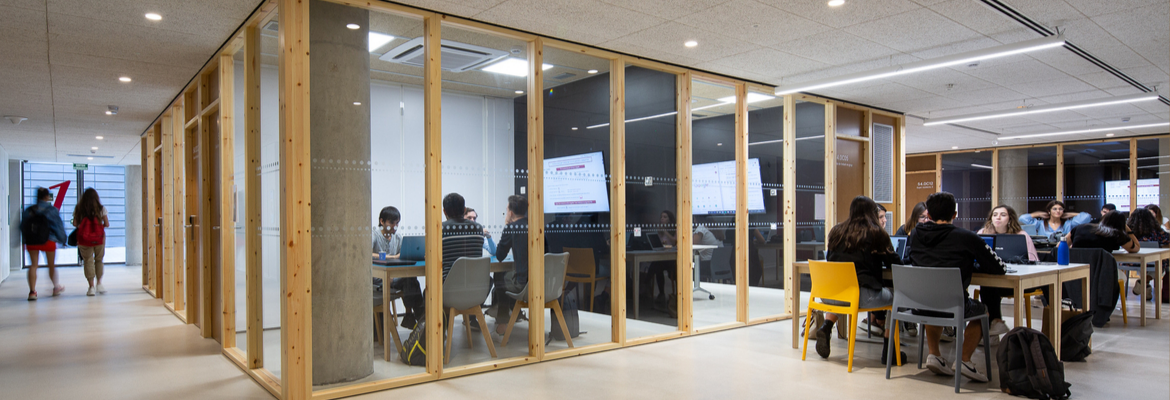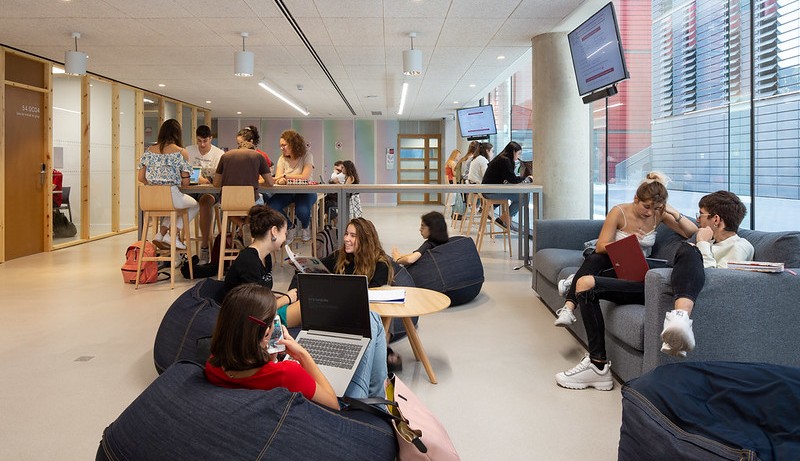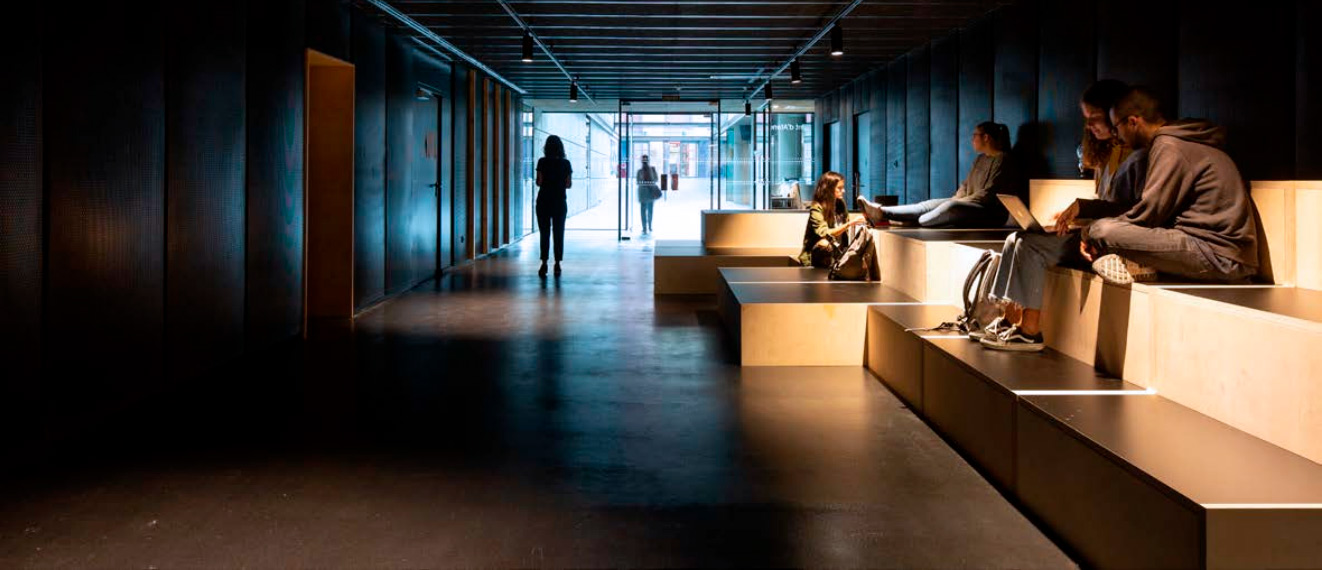On campus
6. On campus
‘In residence in the Tallers area’: promoting external talent in collaboration with the university community
The initiative, launched in the 2019-2020 academic year, brings together six creative, applied research, and entrepreneurial projects in the new co-working space created in the Tallers area of the Poblenou campus.

‘In residence in the Tallers area’ was one of the star initiatives contained in UPF’s 2018-2020 Action Plan to transform the uses of the Tallers area of the Poblenou campus. The aim is to reboot the space to make it a cross-disciplinary hub dedicated to knowledge management and cultural production. Although the campus was only inaugurated ten years ago, work dynamics have changed considerably in the interim. Today there is a need for more flexible, even fluid spaces that can be quickly and efficiently adapted to a wide variety of needs.
Work dynamics have changed considerably in the interim. Today there is a need for more flexible, even fluid spaces that can be quickly and efficiently adapted to a wide variety of needs
Building on this premise, the reinvention of the Tallers area was launched in December 2018, with the aim of turning it into a space of spaces with common areas for collaborative intersectional work involving teaching, research and knowledge transfer. The spaces were designed to accommodate educational dynamics that go beyond formal training to embrace the outside world and generate synergies outside UPF’s walls.
‘When we imagined the overhaul of the Tallers area, we knew from the start that the new activity and creation space had to blend different experiences, break down the walls separating what goes on inside the university from what goes on outside it’, said Jordi Balló, dean of the Faculty of Communication and coordinator of the transformation project. ‘For too long, we have believed that the university does its internal work and, from time to time, radiates outwards’, he said. ‘We want to change that perspective, to understand the university as a public service with a great capacity to act, one that dialogues with cutting-edge industries and offers to collaborate as a change agent. Everyone needs to open up; universities more than any other institution’, Balló added.
The aim now is to understand the university as a public service with a great capacity to act, one that dialogues with cutting-edge industries
The idea for a Tallers area residency programme arose from this intention. The aim is to host people and groups with a creative, applied research, or entrepreneurial project at UPF, so they can carry it out in collaboration with the university community. In other words, it seeks to make the university as permeable as possible and bring in external talent to help it grow through contact and exchanges with the UPF community.

The first call for projects was published in October 2019 and was targeted in particular at alumni from any discipline seeking to carry out highly innovative projects with a practical application. A total of 12 proposals were received. Six projects were ultimately selected, according to criteria of quality, innovation, cross- and interdisciplinarity, interaction with other projects, willingness to transcend the university space, and feasibility.
According to Balló, ‘Giving alumni a place to continue to develop in the present was a way to show that their projects and ways of implementing them were also a basic function of the university that we champion.’
And it had to be done in the most integrated way possible at the university, intentionally locating the residents in a highly visible place. ‘The transformation of the Tallers area, including the replacement of the opaque walls with glass ones, was thus conceived of with the aim of encouraging socializing and collaboration amongst users’, explained Anna Belchi, director of the Poblenou campus. ‘We have managed to provide users with freely accessible spaces that can accommodate both group and individual work and that encourage synergies amongst students from different fields and amongst the residents carrying out their projects there.’
The residency, which began in late November, lasts for nine months and can be extended for another academic year (until July 2021). As part of the programme, the University provides a range of tools and resources to help residents successfully carry out their projects, including:
-
Suitable individual work areas that are nevertheless in contact with other projects.
-
Access to Poblenou campus facilities.
-
Access to the Library services.
-
Access to audiovisual material loans.
-
Regular receipt of information on the university’s social and cultural activities.
-
Advice and access to the platform to design, communicate and promote each project in the social, cultural and industrial spheres.
-
Possibility of participating in the collaborative dialogue with all strata of the university.
Teresa Roig, the Tallers area facilitator, explains that her work with the residents ‘consists of helping them grow their projects, working with them to identify their needs and helping them build collaborative bridges within the university and with industry and society in general, especially the local community’. ‘The feedback we have received so far has been very positive’, she continued, ‘and we are sure it will only get better.’
‘Being in a space like the Tallers area is naturally helping residents connect with students, lecturers and researchers interested in learning more about their projects and even participating in them one way or another’, she added. ‘Projects that would hardly have a chance to interact and dialogue with the rest of the community are doing so naturally.’
‘Being in a space like the Tallers area is naturally helping residents connect with students, lecturers and researchers interested in learning more about their projects and even participating in them one way or another’
Belchi agreed. ‘The changes have been very well received, especially by the students of the different bachelor’s degrees taught on the campus. This has been clear since the new spaces were launched; the common areas are always full.’ She added, ‘The proximity of the resident spaces has piqued students’ curiosity about the projects being carried out there and helped create expectations of participating in future residency calls.’

Meet the residents selected in the first call
On 15 November 2019, the decision announcing the selected projects in the first ‘In residence in the Tallers area’ call was published. The selection committee was made up of Jordi Balló, dean of the Faculty of Communication at UPF and coordinator of the project; Anna Belchi, director of the Poblenou campus; Maria Escrivà, head of the UPF Alumni programme; Teresa Roig, the Tallers area facilitator; Manel Jiménez, commissioner for Education and Communication Projects; and Montse Fabregat, secretary of the Commission.
The selected projects are cross-disciplinary, feasible and will encourage internal interaction and the creation of synergies
Artificio (RESEARCH)
Anna Giralt Gris and Jorge Caballero Ramos.
Artificio [Artifice] is an applied research and audiovisual project about artificial intelligence (AI) and its use in creative work. The audiovisual project consists of an interactive web documentary series about the application of AI in various art forms, such as literature, the visual arts or film, amongst others. In the research portion of the project, we look at the uses and impact of this technology in the arts and disseminate the findings in theoretical and practical workshops so that creators from different disciplines can discover, learn about and use AI in their creative processes.
Observatori de Processos de Transformació Urbana al Poblenou (OPTUP) (RESEARCH)
Pau López Gaitán and Todor Radostinov Kolev
The Observatori de Processos de Transformació Urbana al Poblenou [Poblenou Monitoring Centre for Urban Transformation Processes] aims to analyse, illustrate and question the urban and peri-urban transformation of a selection of Catalan cities, paying special attention to the 22@ district in Barcelona. It monitors mobility, housing, service provision and economic activity from a perspective that includes social justice criteria.
Latentes (CREATION)
Adrian Rodríguez Ortiz, Mireia Aragón Rodríguez and Anna Cuesta Pujol
This dystopian science-fiction project began in 2017 as a UPF bachelor’s degree final project. We designed an interactive short film, which we managed to fund and shoot with the support of patrons on the Verkami platform.
In the Tallers residency, Latentes aims to create the first season of a series and see it through to reality. We think our underlying idea – this corrupt world – is rich enough to create a credible and engaging serial universe.
Ethical Time (ENTREPRENEURSHIP)
Ignasi Eiriz Alonso, Eduard Martin Peguer, Anna Labarias Bedmar and Natalia Eiriz Alonso
Ethical Time is a digital platform for ethical and sustainable fashion. It is the alternative to the current fashion industry universe, one of the world’s most productive industries and one of its biggest polluters. Its production and supply chains are also some of the worst human and labour right violators. Our mission is to enable purchases that are more respectful of people, the environment and animals. To accomplish this, we have created a unique platform to bring together all the small brands that are working responsibly.
MeLoc (ENTREPRENEURSHIP)
Alba Bresolí Aliberch, Tom McClean and Aida Bresolí Aliberch i Oguzhan Yayla
MeLoc is a sharing economy marketplace that connects audiovisual and photography industry professionals with owners to offer them a catalogue of unique locations for film and photo shoots. In addition to streamlining the location scouting process, this ‘filmmakers’ Airbnb’ offers extra production services, including ‘making of’ documentaries and equipment rental to finish the shoot.
One Tap (ENTREPRENEURSHIP)
Miquel Martí Mestres and Daniel Alcaide Martin
One Tap is a technological innovation and entrepreneurship project that aims to launch a start-up leading to the creation and market roll-out of a WiFi-based electronic device. The purpose of the technology is to afford exclusive access to information to people who are physically nearby.
The Tallers area, a product and driver of EDvolution, UPF’s new education model
The new Tallers area was created to meet the need to address emerging knowledge and learning challenges posed by the EDvolution project, UPF’s new education model. The university has been working since late 2017 to define its own model, which expresses its particular singularity as an educational institution and adapts to the needs of tomorrow’s professionals, companies and social agents.
The transformation of the university’s spaces is one of the new model’s objectives. The model was designed taking into account student flexibility and versatility; cross-disciplinary learning; the integration of collaborative efforts between society, industry and the university; knowledge creation; and the integration of teaching and research.
‘The “In residence in the Tallers area” proposal in particular optimally promotes project-based work, support for initiatives, the new learning architecture and, especially, the desire to bring the university, industry and a mobilized civil society together to have a real impact. It thus fits perfectly in the new model’
‘The entire Tallers area is both a product and a driver of the EDvolution model; neither project can be understood without the other’, said Balló. ‘The “In residence in the Tallers area” proposal in particular optimally promotes project-based work, support for initiatives, the new learning architecture and, especially, the desire to bring the university, industry and a mobilized civil society together to have a real impact. It thus fits perfectly in the new model’, he underscored.
The transformation of the Poblenou campus space is one of the first actions taken in this direction. The EDvolution model includes redesigning available spaces to turn them into multipurpose facilities capable of accommodating all kinds of activities and events (tutorial sessions, group work, talks, co-working, etc.). This reorganization has to be especially adapted to the needs of digital natives: fixed work spaces need to be eliminated and gradually replaced with flexible, fluid spaces that enable complete mobility and connection. Above all, they need to link learning to real-world opportunities and help students network and find funding whilst connecting them with local initiatives, investors and government representatives through programmes and special events.
